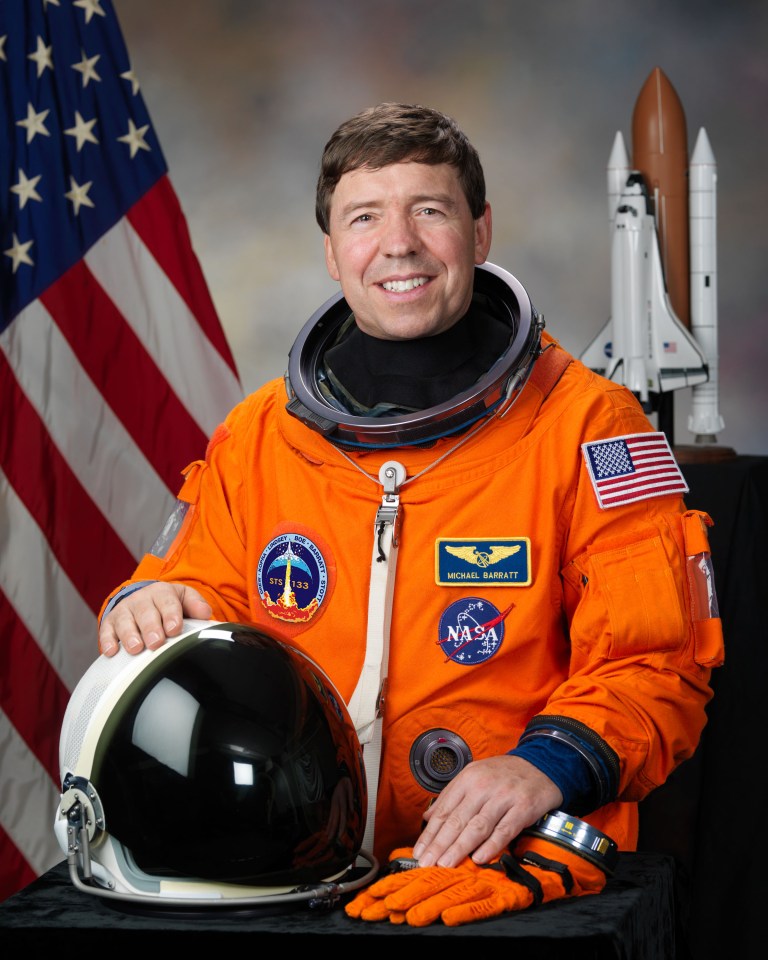
Michael Reed Barratt
Summary
Dr. Michael R. Barratt was selected by NASA in 2000. Board certified in Internal and Aerospace Medicine, he has participated in two spaceflights. In 2009, Dr. Barratt served as Flight Engineer for Expedition 19/20. This marked the transition from three to six permanent International Space Station crew members. During this time, he performed two spacewalks. He also flew on STS-133, which delivered the Permanent Multipurpose Module and fourth Express Logistics Carrier. Dr. Barratt served in the Mission Support branches providing medical and human factors expertise to multiple spaceflight programs. He has spent a total of 212 days in space across two spaceflights. Dr. Barratt launched to the International Space Station March 3, 2024, as pilot of NASA’s SpaceX Crew-8 mission. He served as a flight engineer aboard the orbiting laboratory. NASA’s SpaceX Crew-8 mission successfully splashed down at 3:29 a.m. EDT Friday, off Pensacola, Florida, concluding a nearly eight-month science mission and the agency’s eighth commercial crew rotation mission to the International Space Station
Personal Data
Born in Vancouver, Washington. Considers Camas, Washington, to be his home town. Married to the former Michelle Lynne Sasynuik. They have five children. His mother, Donna Barratt, resides in Camas, Washington. Personal and recreational interests include sailing, boat restoration and nautical history, carpentry, writing, cooking good food in austere places, family and church activities.
Education
Graduated from Camas High School, Camas, WA, 1977. Bachelor of Science in Zoology, University of Washington, 1981. Doctor of Medicine (M.D.) from Northwestern University, 1985. Completed a three-year residency in Internal Medicine at Northwestern University in 1988. Completed Chief Residency year at Veterans Administration Lakeside Hospital in Chicago in 1989. Completed residency and Master’s program in Aerospace Medicine at Wright State University in 1991. Board certified in Internal and Aerospace Medicine.
Experience
Dr. Barratt came to NASA JSC in May 1991 employed as a project physician with KRUG Life Sciences, working on medical systems for Space Station Freedom. In July 1992, he was assigned as NASA Flight Surgeon, working in Space Shuttle Medical Operations. In January 1994, he was assigned to the joint U.S./Russian Shuttle – Mir Program, working and training extensively in the Cosmonaut Training Center, Star City, Russia, in support of the Mir-18/STS-71 and subsequent missions.
From July 1995 to July 1998, he served as Medical Operations Lead for the International Space Station (ISS). A frequent traveler to Russia, he worked with counterparts at the Gagarin Cosmonaut Training Center and Institute of Biomedical Problems as well as other international partner centers. Dr. Barratt served as lead crew surgeon for the first expedition crew to ISS from July 1998 until he was selected as an astronaut.
Dr. Barratt has a particular interest in human adaptation to space flight and serves as Associate Editor for Space Medicine for the journal, Aerospace Medicine and Human Performance and is senior editor of the textbook, Principles of Clinical Medicine for Space Flight, now in 2nd edition. Dr. Barratt lectures extensively in space and extreme medicine.
Selected as a mission specialist by NASA in July 2000, Dr. Barratt reported for training in August 2000. Following the completion of 2 years of training and evaluation, he was assigned technical duties in the Astronaut Office Station Operations Branch.
From January of 2012 through April of 2013, Dr. Barratt was Manager of the Human Research Program at NASA Johnson Space Center. This program guides applied research oriented toward mitigating the most prominent health and performance risks associated with human spaceflight. Since that time Dr. Barratt has worked payload science for the International Space Station and has been extensively involved in medical and human factors applications for new space vehicles in the Commercial Crew and Artemis Programs as well as space medical risks and research efforts.
Spaceflight Experience
Expedition 19/20 (March 26, 2009 to October 11, 2009). Dr. Barratt launched as Flight Engineer on Soyuz TMA-14 to the station on March 26, 2009. During this time period, Dr. Barratt as the US Segment Lead participated in the transition from three to six permanent station crew members, and oversaw two visiting space shuttles and the arrival of the first Japanese H-II Transfer Vehicle (HTV). Dr. Barratt performed two spacewalks in the Russian Orlan suit and participated in further station construction and onboard experiments. Completing 199 days in space, he landed on October 11, 2009.
STS-133 (February 24 to March 9, 2011). Dr. Barratt served as Mission Specialist on STS-133, the 39th and final mission for Space Shuttle Discovery. He served as lead for Rendezvous and Station Robotics. During the 13-day flight, the Discovery crew delivered the Permanent Multipurpose Module (PMM) and the fourth Express Logistics Carrier (ELC) to the station. The mission’s two spacewalks assisted in outfitting the truss of the station and completed a variety of other tasks designed to upgrade station systems. The mission was accomplished in 202 Earth orbits, traveling 5.3 million miles in 307 hours and 3 minutes.
Dr. Barratt launched to the International Space Station March 3, 2024, as pilot of NASA’s SpaceX Crew-8 mission. He served as a flight engineer aboard the orbiting laboratory. NASA’s SpaceX Crew-8 mission successfully splashed down at 3:29 a.m. EDT Friday, off Pensacola, Florida, concluding a nearly eight-month science mission and the agency’s eighth commercial crew rotation mission to the International Space Station.
Awards/Honors
Hubertus Strughold Award for Contributions to Space Medicine Research, 2011; Joseph P. Kerwin award for Advancements in Space Medicine, Aerospace Medical Association, 2010; W. Randolph Lovelace Award (1998), Society of NASA Flight Surgeons; Melbourne W. Boynton Award (1995), American Astronautical Society; USAF Flight Surgeons Julian Ward Award (1992); Wright State University Outstanding Graduate Student, Aerospace Medicine (1991); Alpha Omega Alpha Medical Honor Society, Northwestern University Medical School, Chicago, IL (1988); Phi Beta Kappa, University of Washington, Seattle, WA (1981).
Pronunciation
MY-kull BEAR-it

























